Team Case Study: Auditing and Assurance, Corporate Governance Analysis
VerifiedAdded on 2023/06/07
|6
|1058
|280
Case Study
AI Summary
This case study examines the corporate governance processes of a company, specifically focusing on the role of the board of directors and the audit committee. The analysis explores the company's adherence to corporate governance principles, including board approval processes and meeting frequency. It assesses the composition and functions of the audit committee, evaluating its benefits to the company, auditors, the auditing profession, and society. The study highlights the importance of the audit committee in overseeing financial reporting, ensuring auditor independence, and promoting public accountability. The case study references relevant literature to support its findings and conclusions regarding the effectiveness of corporate governance practices in the context of auditing and assurance.
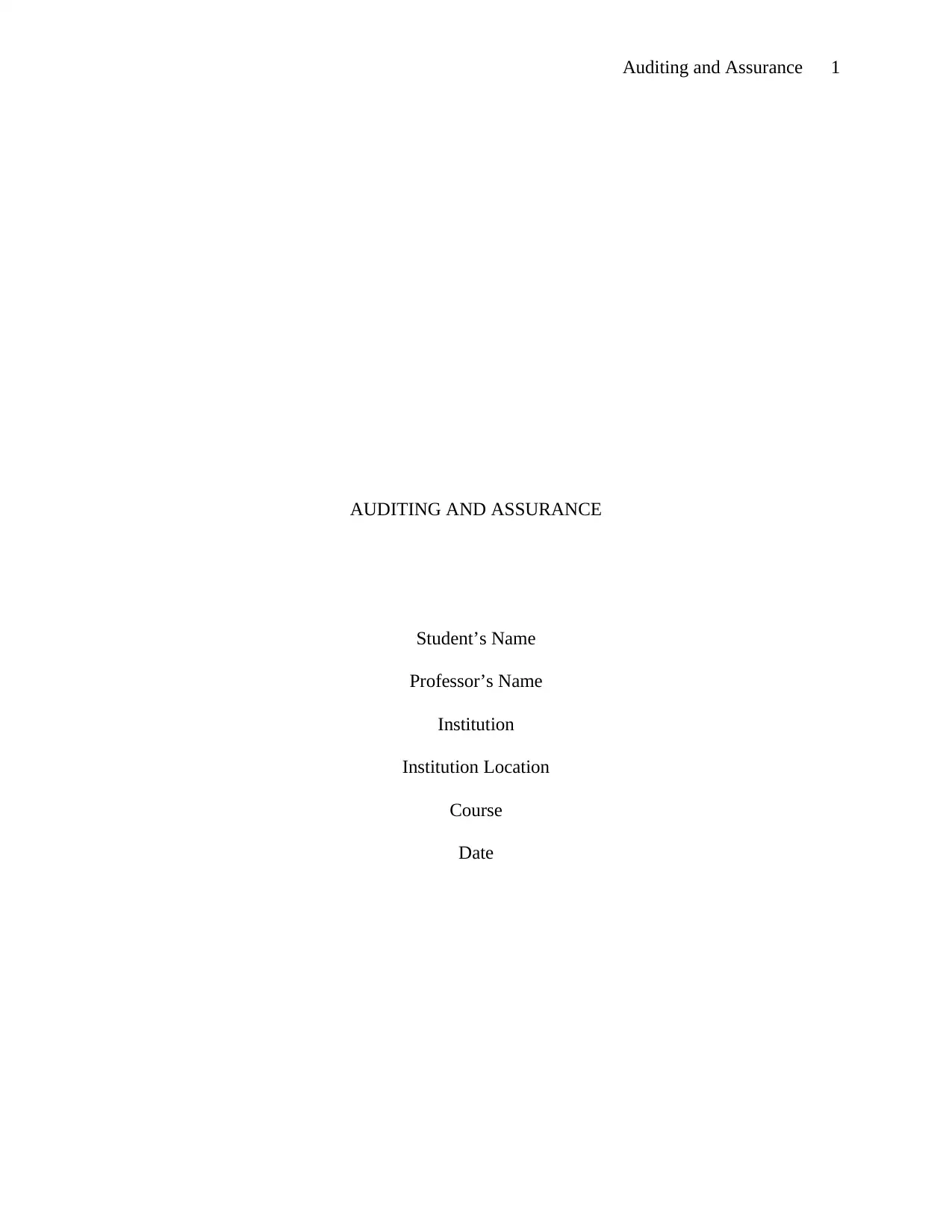
Auditing and Assurance 1
AUDITING AND ASSURANCE
Student’s Name
Professor’s Name
Institution
Institution Location
Course
Date
AUDITING AND ASSURANCE
Student’s Name
Professor’s Name
Institution
Institution Location
Course
Date
Paraphrase This Document
Need a fresh take? Get an instant paraphrase of this document with our AI Paraphraser
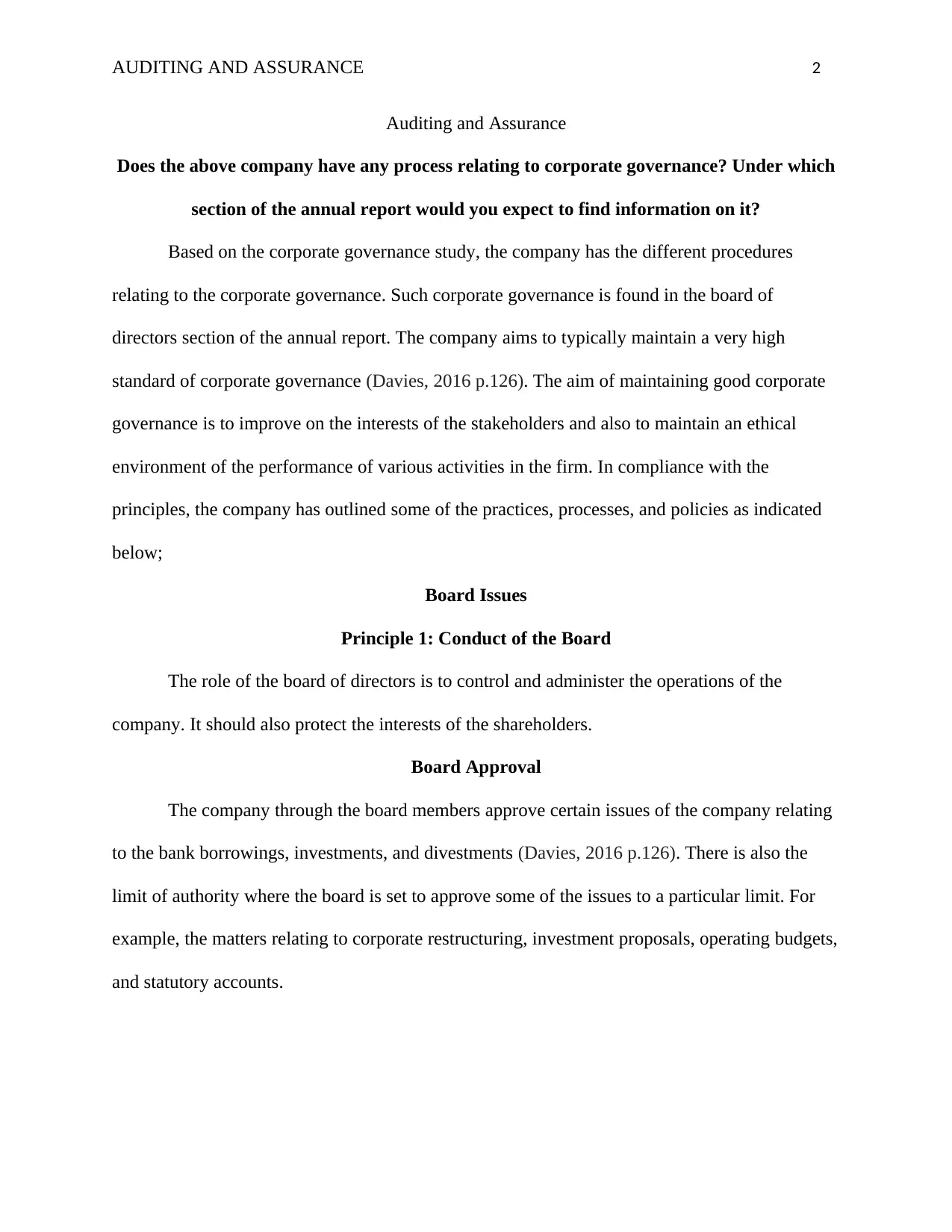
AUDITING AND ASSURANCE 2
Auditing and Assurance
Does the above company have any process relating to corporate governance? Under which
section of the annual report would you expect to find information on it?
Based on the corporate governance study, the company has the different procedures
relating to the corporate governance. Such corporate governance is found in the board of
directors section of the annual report. The company aims to typically maintain a very high
standard of corporate governance (Davies, 2016 p.126). The aim of maintaining good corporate
governance is to improve on the interests of the stakeholders and also to maintain an ethical
environment of the performance of various activities in the firm. In compliance with the
principles, the company has outlined some of the practices, processes, and policies as indicated
below;
Board Issues
Principle 1: Conduct of the Board
The role of the board of directors is to control and administer the operations of the
company. It should also protect the interests of the shareholders.
Board Approval
The company through the board members approve certain issues of the company relating
to the bank borrowings, investments, and divestments (Davies, 2016 p.126). There is also the
limit of authority where the board is set to approve some of the issues to a particular limit. For
example, the matters relating to corporate restructuring, investment proposals, operating budgets,
and statutory accounts.
Auditing and Assurance
Does the above company have any process relating to corporate governance? Under which
section of the annual report would you expect to find information on it?
Based on the corporate governance study, the company has the different procedures
relating to the corporate governance. Such corporate governance is found in the board of
directors section of the annual report. The company aims to typically maintain a very high
standard of corporate governance (Davies, 2016 p.126). The aim of maintaining good corporate
governance is to improve on the interests of the stakeholders and also to maintain an ethical
environment of the performance of various activities in the firm. In compliance with the
principles, the company has outlined some of the practices, processes, and policies as indicated
below;
Board Issues
Principle 1: Conduct of the Board
The role of the board of directors is to control and administer the operations of the
company. It should also protect the interests of the shareholders.
Board Approval
The company through the board members approve certain issues of the company relating
to the bank borrowings, investments, and divestments (Davies, 2016 p.126). There is also the
limit of authority where the board is set to approve some of the issues to a particular limit. For
example, the matters relating to corporate restructuring, investment proposals, operating budgets,
and statutory accounts.
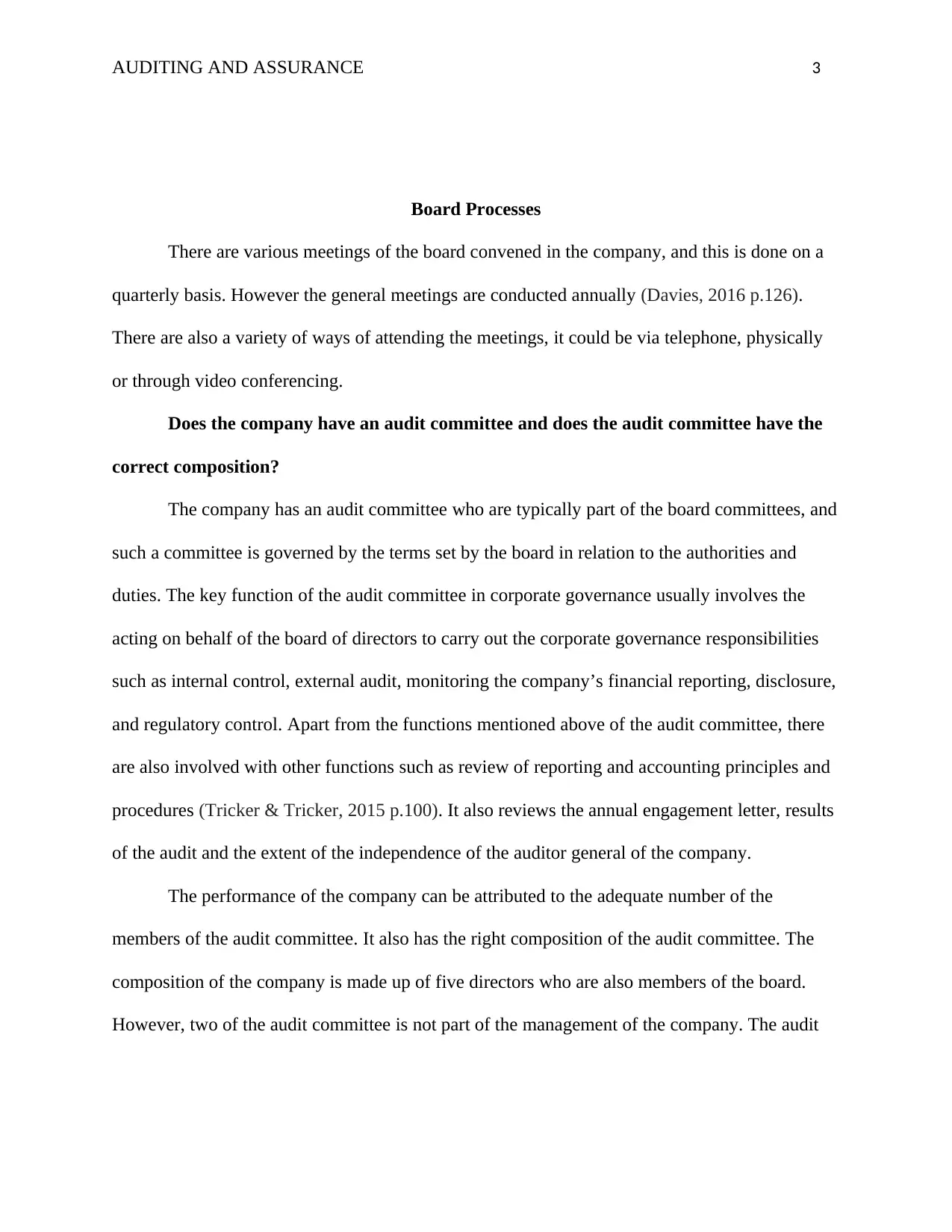
AUDITING AND ASSURANCE 3
Board Processes
There are various meetings of the board convened in the company, and this is done on a
quarterly basis. However the general meetings are conducted annually (Davies, 2016 p.126).
There are also a variety of ways of attending the meetings, it could be via telephone, physically
or through video conferencing.
Does the company have an audit committee and does the audit committee have the
correct composition?
The company has an audit committee who are typically part of the board committees, and
such a committee is governed by the terms set by the board in relation to the authorities and
duties. The key function of the audit committee in corporate governance usually involves the
acting on behalf of the board of directors to carry out the corporate governance responsibilities
such as internal control, external audit, monitoring the company’s financial reporting, disclosure,
and regulatory control. Apart from the functions mentioned above of the audit committee, there
are also involved with other functions such as review of reporting and accounting principles and
procedures (Tricker & Tricker, 2015 p.100). It also reviews the annual engagement letter, results
of the audit and the extent of the independence of the auditor general of the company.
The performance of the company can be attributed to the adequate number of the
members of the audit committee. It also has the right composition of the audit committee. The
composition of the company is made up of five directors who are also members of the board.
However, two of the audit committee is not part of the management of the company. The audit
Board Processes
There are various meetings of the board convened in the company, and this is done on a
quarterly basis. However the general meetings are conducted annually (Davies, 2016 p.126).
There are also a variety of ways of attending the meetings, it could be via telephone, physically
or through video conferencing.
Does the company have an audit committee and does the audit committee have the
correct composition?
The company has an audit committee who are typically part of the board committees, and
such a committee is governed by the terms set by the board in relation to the authorities and
duties. The key function of the audit committee in corporate governance usually involves the
acting on behalf of the board of directors to carry out the corporate governance responsibilities
such as internal control, external audit, monitoring the company’s financial reporting, disclosure,
and regulatory control. Apart from the functions mentioned above of the audit committee, there
are also involved with other functions such as review of reporting and accounting principles and
procedures (Tricker & Tricker, 2015 p.100). It also reviews the annual engagement letter, results
of the audit and the extent of the independence of the auditor general of the company.
The performance of the company can be attributed to the adequate number of the
members of the audit committee. It also has the right composition of the audit committee. The
composition of the company is made up of five directors who are also members of the board.
However, two of the audit committee is not part of the management of the company. The audit
⊘ This is a preview!⊘
Do you want full access?
Subscribe today to unlock all pages.

Trusted by 1+ million students worldwide
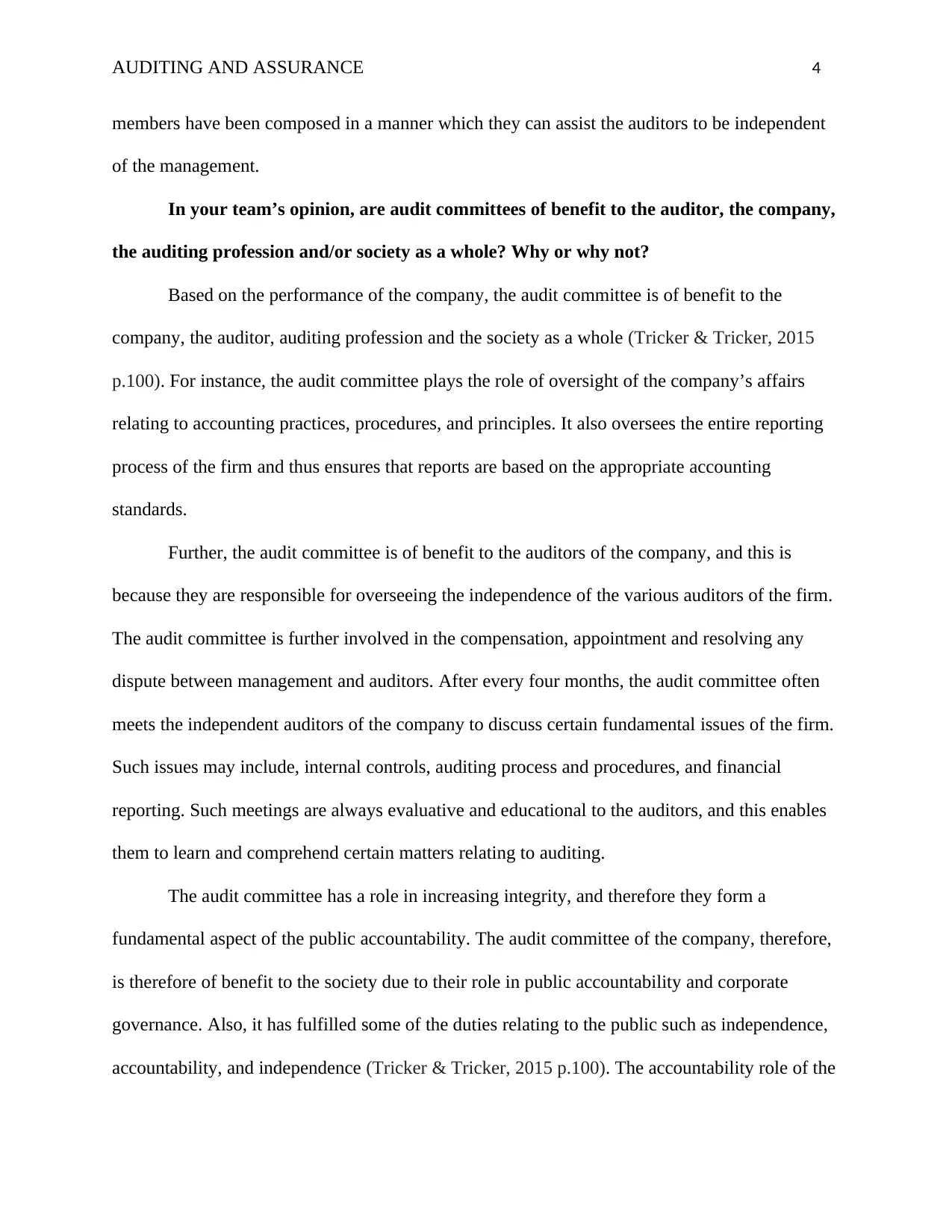
AUDITING AND ASSURANCE 4
members have been composed in a manner which they can assist the auditors to be independent
of the management.
In your team’s opinion, are audit committees of benefit to the auditor, the company,
the auditing profession and/or society as a whole? Why or why not?
Based on the performance of the company, the audit committee is of benefit to the
company, the auditor, auditing profession and the society as a whole (Tricker & Tricker, 2015
p.100). For instance, the audit committee plays the role of oversight of the company’s affairs
relating to accounting practices, procedures, and principles. It also oversees the entire reporting
process of the firm and thus ensures that reports are based on the appropriate accounting
standards.
Further, the audit committee is of benefit to the auditors of the company, and this is
because they are responsible for overseeing the independence of the various auditors of the firm.
The audit committee is further involved in the compensation, appointment and resolving any
dispute between management and auditors. After every four months, the audit committee often
meets the independent auditors of the company to discuss certain fundamental issues of the firm.
Such issues may include, internal controls, auditing process and procedures, and financial
reporting. Such meetings are always evaluative and educational to the auditors, and this enables
them to learn and comprehend certain matters relating to auditing.
The audit committee has a role in increasing integrity, and therefore they form a
fundamental aspect of the public accountability. The audit committee of the company, therefore,
is therefore of benefit to the society due to their role in public accountability and corporate
governance. Also, it has fulfilled some of the duties relating to the public such as independence,
accountability, and independence (Tricker & Tricker, 2015 p.100). The accountability role of the
members have been composed in a manner which they can assist the auditors to be independent
of the management.
In your team’s opinion, are audit committees of benefit to the auditor, the company,
the auditing profession and/or society as a whole? Why or why not?
Based on the performance of the company, the audit committee is of benefit to the
company, the auditor, auditing profession and the society as a whole (Tricker & Tricker, 2015
p.100). For instance, the audit committee plays the role of oversight of the company’s affairs
relating to accounting practices, procedures, and principles. It also oversees the entire reporting
process of the firm and thus ensures that reports are based on the appropriate accounting
standards.
Further, the audit committee is of benefit to the auditors of the company, and this is
because they are responsible for overseeing the independence of the various auditors of the firm.
The audit committee is further involved in the compensation, appointment and resolving any
dispute between management and auditors. After every four months, the audit committee often
meets the independent auditors of the company to discuss certain fundamental issues of the firm.
Such issues may include, internal controls, auditing process and procedures, and financial
reporting. Such meetings are always evaluative and educational to the auditors, and this enables
them to learn and comprehend certain matters relating to auditing.
The audit committee has a role in increasing integrity, and therefore they form a
fundamental aspect of the public accountability. The audit committee of the company, therefore,
is therefore of benefit to the society due to their role in public accountability and corporate
governance. Also, it has fulfilled some of the duties relating to the public such as independence,
accountability, and independence (Tricker & Tricker, 2015 p.100). The accountability role of the
Paraphrase This Document
Need a fresh take? Get an instant paraphrase of this document with our AI Paraphraser
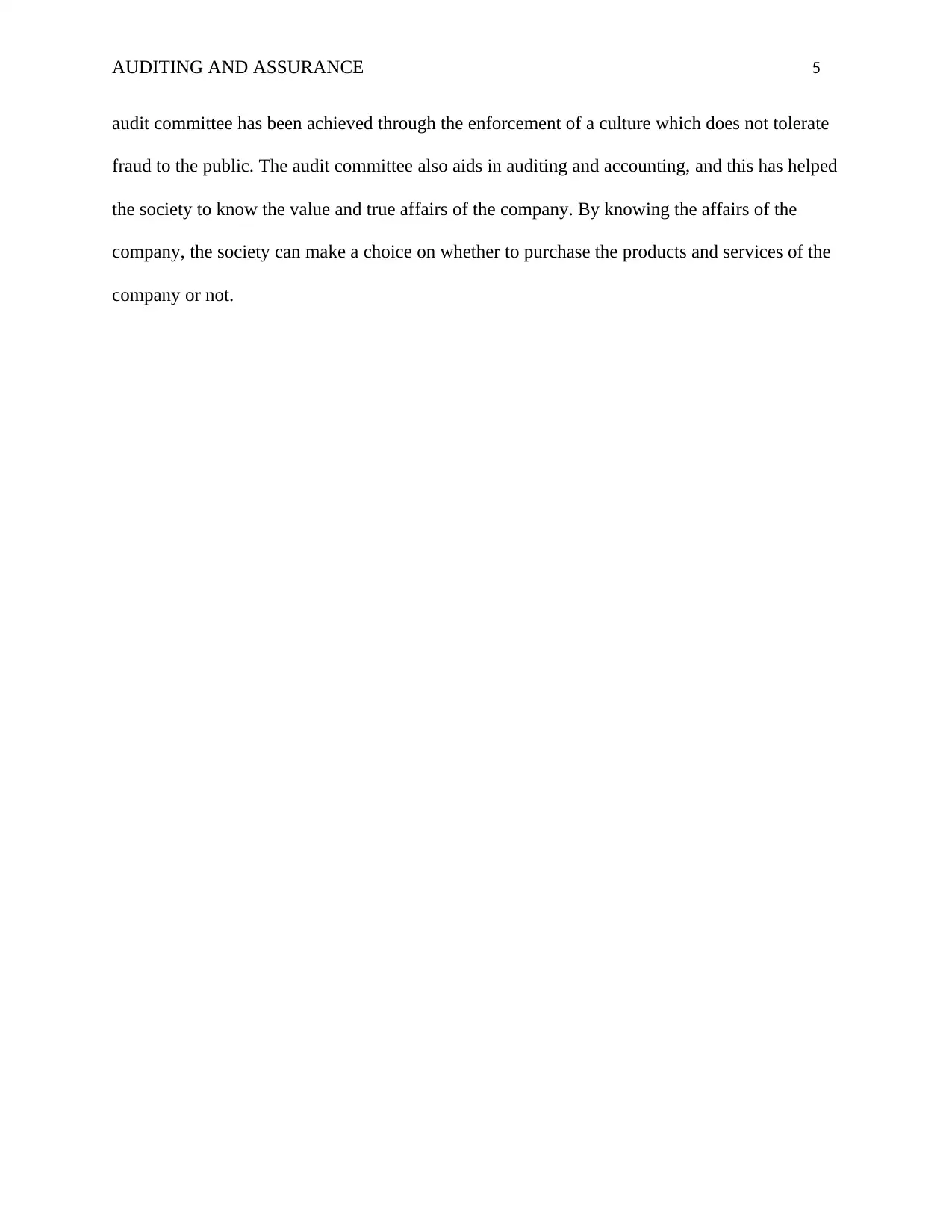
AUDITING AND ASSURANCE 5
audit committee has been achieved through the enforcement of a culture which does not tolerate
fraud to the public. The audit committee also aids in auditing and accounting, and this has helped
the society to know the value and true affairs of the company. By knowing the affairs of the
company, the society can make a choice on whether to purchase the products and services of the
company or not.
audit committee has been achieved through the enforcement of a culture which does not tolerate
fraud to the public. The audit committee also aids in auditing and accounting, and this has helped
the society to know the value and true affairs of the company. By knowing the affairs of the
company, the society can make a choice on whether to purchase the products and services of the
company or not.
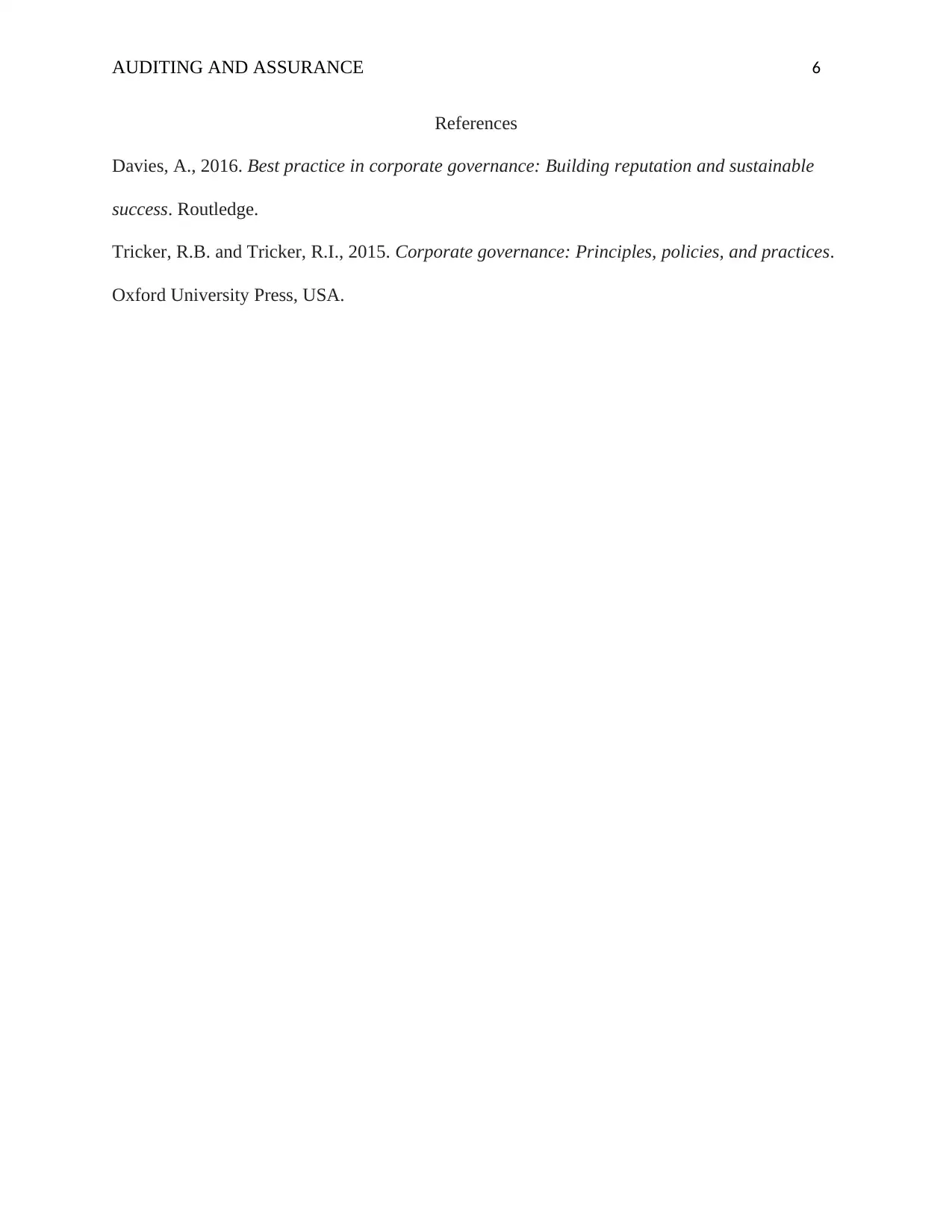
AUDITING AND ASSURANCE 6
References
Davies, A., 2016. Best practice in corporate governance: Building reputation and sustainable
success. Routledge.
Tricker, R.B. and Tricker, R.I., 2015. Corporate governance: Principles, policies, and practices.
Oxford University Press, USA.
References
Davies, A., 2016. Best practice in corporate governance: Building reputation and sustainable
success. Routledge.
Tricker, R.B. and Tricker, R.I., 2015. Corporate governance: Principles, policies, and practices.
Oxford University Press, USA.
⊘ This is a preview!⊘
Do you want full access?
Subscribe today to unlock all pages.

Trusted by 1+ million students worldwide
1 out of 6
Related Documents
Your All-in-One AI-Powered Toolkit for Academic Success.
+13062052269
info@desklib.com
Available 24*7 on WhatsApp / Email
![[object Object]](/_next/static/media/star-bottom.7253800d.svg)
Unlock your academic potential
Copyright © 2020–2026 A2Z Services. All Rights Reserved. Developed and managed by ZUCOL.





